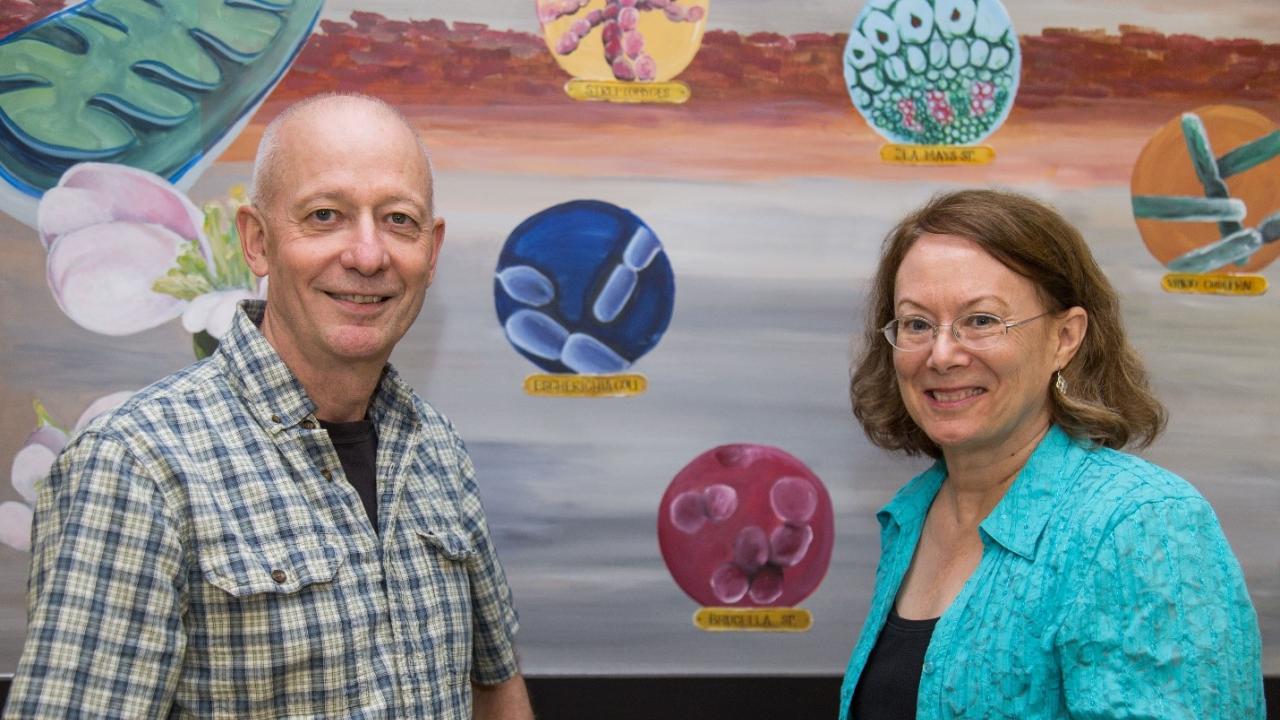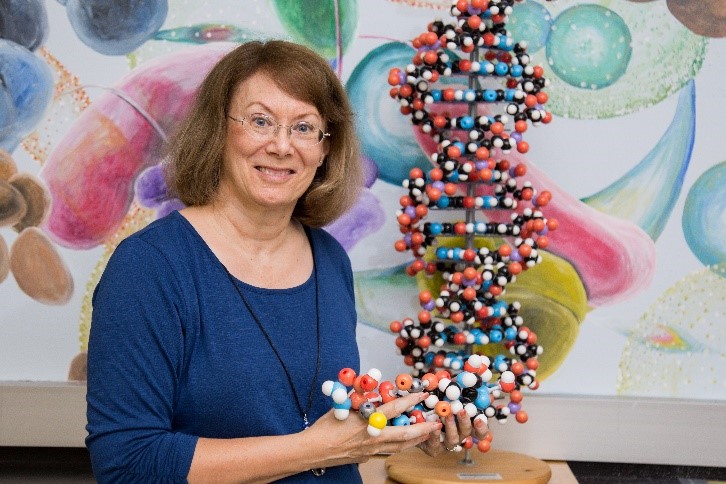
Luca Comai and Michele Igo Receive College of Biological Sciences Faculty Teaching Award
The College of Biological Sciences Faculty Teaching Award has two recipients for the 2016-2017 year. Luca Comai, professor of plant biology, and Michele Igo, professor and vice chair of microbiology and molecular genetics, are recognized for their excellence in teaching through enthusiasm and effectiveness of instruction, application of technology and innovation in the classroom, and mentorship and motivation of students.
Luca Comai
Comai, a UC Davis alumnus, instructs BIS 101, a genetics course required for all undergraduates within the college. With a lecture style described as relaxed, but humorous, Comai sets students at ease to help facilitate their ability to grasp unfamiliar and complex materials. He possesses extensive experience in both higher education and private industry, and joined UC Davis as a faculty member in 2006.
As a researcher, Comai is renowned for his contribution to the engineering of glyphosate-resistance (Roundup herbicide) in crops, which has helped food producers significantly improve crop yields. He continues to develop approaches to functional genomics and genome analysis, with an emphasis on chromosome regulation. He develops and improves methods to discover mutations in plant genes. Comai received a Ph.D. in Plant Pathology from UC Davis, where he also completed his postdoctoral research.
“I am grateful to the College for this recognition and look forward to further improving and innovating our active learning curriculum,” Comai said.
Illustrating scientific understanding

Lauded for his artistic creativity, Comai is known to frequently draw cartoon models on classroom whiteboards. These illustrations give life to critical concepts being introduced to students and provide engaging visuals to aid classroom instruction.
Last year, Comai partnered with UC Davis Academic Technology Services to produce a series of 21 Learning Glass videos on YouTube for BIS 101. Playing to his artistic inclinations, these videos follow Comai’s whiteboard writing and illustrations as he narrates each mini lecture. His “Genetic Epistasis” video has received more than 22,000 views.
“His personality, specifically his patience and sense of humor, make him very approachable,” commented one student in a course review. “His ability to realize that it is okay for a student to be lost or to need help allows the student to feel motivated to participate in class,”
Innovation in the classroom
To improve course delivery, Comai piloted a “flipped” course structure for BIS 101, in which the typical lecture and homework elements of a class are reversed. Students review a short video lecture at home prior to the class session, and devote classroom time to exercises, projects and discussions.
The approach has been a success, and to inform other instructors on the merits of “flipping” he launched a blog called Flipping Genetics 101. Ever the scientist, Comai’s blog posts are peppered with data, graphs and other insights to track the effectiveness of this teaching methodology. He hosted a faculty workshop on his experiences, and a number of other courses are being considered for “flipping”.
“Dr. Comai is a world-leading scientist and has a passion for teaching and innovation. His teaching style and methods excites and energizes students,” said Department of Plant Biology chair Savithramma Dinesh-Kumar. “He also understands the importance of teamwork and sharing of teaching methodologies in order to advance knowledge in the classroom.”
Comai has also embraced technology to launch an online chat room to augment his office hours and even developed a computer program which scrambles the order of questions and answers on exams, then descrambles them for grading. Chagrined peeping pupils aside, his software has allowed interested faculty to hold midterms and finals with students in every seat, reducing the need for large meeting spaces to conduct tests.
Michele Igo

During her 20 years at UC Davis, Igo has instructed a multitude of courses, including introductory biology, general microbiology lecture and labs, bacterial physiology, bacterial genetics and bacterial regulatory mechanisms. Since 2001, she has served as vice chair of the Department of Microbiology and Molecular Genetics. For the past six years, Igo has also instructed BIS 2A, part of an introductory three-course core. Students have called her teaching style approachable, dedicated and comprehensive.
Igo studies the role of cell surface proteins in the virulence of the bacterium Xylella fastidiosa, which is responsible for Pierce’s Disease of Grapevines. This disease is transmitted by insects that introduce the bacterium into the tissue responsible for the movement of water in the plant. The bacteria clog the vines, resulting in shriveled fruit and the eventual death of the plant. Igo’s research seeks to develop ways to interfere with the bacterium’s ability to attach to grape vine xylem tissues. She received a Ph.D. in Biology from Harvard University and did her postdoctoral work in molecular biology at Princeton University.
“I am honored to be recognized with this award, as it demonstrates the support of my department and the college for faculty who are looking for new ways to facilitate the learning of all students,” Igo said.
Facilitating applied learning
By adding active learning techniques to the BIS 2A lectures, such as case studies, problem-solving scenarios and collaborative online assignments, Igo’s goal is to encourage students’ critical thinking abilities and to help them apply course material to new situations. The inclusion of open-ended questions and time for students to interact in lectures gives students the opportunity to apply and reinforce the concepts as they are learned.
She has taken the lead in the administration, organization and continuing development of the BIS 2A course delivery. Each quarter, Igo and the other members of the BIS 2A learning team, update and improve the course, shifting the focus to further emphasize problem-solving skills. While still in the early stages, the learning outcomes of students continue to improve.
The results of the course improvements are clear. Over time, students have repeatedly demonstrated an increased ability to answer higher-order questions. These questions apply an understanding of concepts to unfamiliar situations, rather than just recalling ideas or facts from memory.
A passion for student success
Igo has designed special discussion sections of BIS 2A for students, who need to repeat the course. She has also developed a co-course for BIS2A, which is offered to students who have been identified by campus as needing extra assistance. The co-course, which meets three times a week, emphasizes study habits, course material and time management skills to help students identify tactics to improve their academic success.
“Dr. Igo is a tireless and dedicated academic educator and faculty colleague who is able to effectively communicate difficult concepts across a wide range of subjects,” said Department of Microbiology and Molecular Genetics chair Wolf-Dietrich Heyer. “She is an invaluable asset in the mission of our department, the College of Biological Sciences and UC Davis."
Igo was recognized this year by the UC Davis Educational Opportunity program for her contributions to promoting educational equity for first-generation and low-income students. She is also a co-principal investigator on a recent $1 million grant from the Howard Hughes Medical Institute designed to equip faculty with the tools and resources to close achievement gaps between different student populations.
